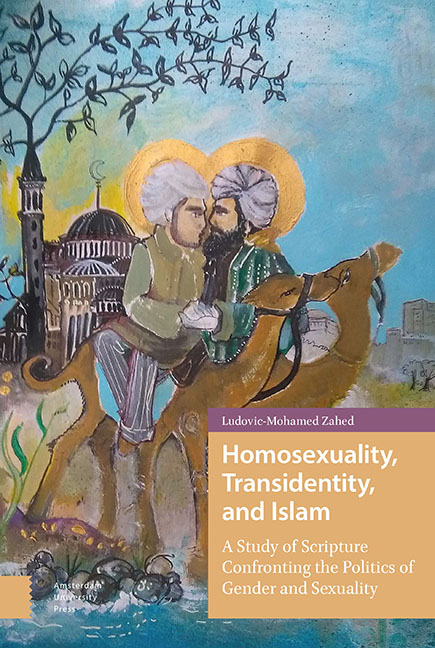 Homosexuality, Transidentity, and Islam
Homosexuality, Transidentity, and Islam Book contents
- Frontmatter
- Contents
- List of Figures
- Acknowledgments
- Foreword
- Introduction
- I The Qur’anic Ethics of “Nature”: Gender, Sexuality, and Diversity
- II Distressing Qur’anic Verses?
- III The Prophet: A Living Incarnation of Qur’anic Ethics
- IV Islamic Apocrypha Advocating the Stoning of “Sodomites”
- V Postcolonial Orientalisms
- VI “Abnormals”: From Cultural Diversity to Dogmatic Uniformity
- VII Towards a Structural Reevaluation of Cultural Values
- VIII Pan-Arabist Literary and Identity Censorship
- IX Orientalist Shi’ism and Literary Homoeroticism
- X Homonationalism and Performative Sexual Categorization
- XI A “Crisis” of Categories, Geopolitics or Civilization
- Conclusion
- Afterword
- Bibliography
- Index
IV - Islamic Apocrypha Advocating the Stoning of“Sodomites”
Published online by Cambridge University Press: 20 November 2020
- Frontmatter
- Contents
- List of Figures
- Acknowledgments
- Foreword
- Introduction
- I The Qur’anic Ethics of “Nature”: Gender, Sexuality, and Diversity
- II Distressing Qur’anic Verses?
- III The Prophet: A Living Incarnation of Qur’anic Ethics
- IV Islamic Apocrypha Advocating the Stoning of “Sodomites”
- V Postcolonial Orientalisms
- VI “Abnormals”: From Cultural Diversity to Dogmatic Uniformity
- VII Towards a Structural Reevaluation of Cultural Values
- VIII Pan-Arabist Literary and Identity Censorship
- IX Orientalist Shi’ism and Literary Homoeroticism
- X Homonationalism and Performative Sexual Categorization
- XI A “Crisis” of Categories, Geopolitics or Civilization
- Conclusion
- Afterword
- Bibliography
- Index
Summary
Abstract
This chapter investigates how some Qur’anictraditions take a stance in relation to the deathsentence for “sodomites” that was allegedlyrecommended – without ever being applied – by theProphet. It is shown how all the differentversions of these traditions can be traced back toa single, unreliable source.
Keywords: traditions classification,reliable sources, the Prophet's Companions
The Sectarian Ideology of Fatwas Associating“Sodomy” with Apostasy
It may appear difficult to gain a clear understandingof the matter at hand through these 20 or sotraditions, most of which are certainly apocryphal.Nevertheless, one of the versions of thesetraditions might help us take a stance in relationto the sole death sentence for “sodomites” allegedlyrecommended – without ever being applied – by theProphet. All the different versions of thesetraditions concerning the status of “sodomites” goback to a single source (isnad), namely the controversial figureof ‘Ikrimah, an Amazigh slave captured during one ofthe first military campaigns of the Muslims in NorthAfrica. There is no alternative chain of narration;all the isnad of thesetraditions pass, in one way or another, through thissingle narrator (Kugle, 2010, p. 103).
‘Ikrimah was in the service of Ibn ‘Abbas, a cousin ofthe Prophet. ‘Ikrimah was at once praised for thebreadth of his knowledge and criticized for histendency to exaggerate (Ibn S’ad, 1904, vol. 2, p.133). Renowned hadith scholars, such as Al-Bukhariand Muslim, systematically rejected any oraltradition which had ‘Ikrimah as the only narrator.Several companions of the Prophet, among whomstudents of Ibn ‘Abbas himself, were wary of‘Ikrimah. One such companion, Tawus, is reported tohave said the following about Ibn ‘Abbas's slave:“If only this slave, belonging to Ibn ‘Abbas, couldfear God and refrain from disseminating his hadithslike someone keeping his camel attached” (Ibn S’ad,1904, vol. 2, pp. 212-226). Suffice it to say thatseveral people considered ‘Ikrimah a liar. Inaccordance with the basic principles of determiningthe authenticity of hadiths, the slightest doubtabout a narrator ought to compel us to reject all ofhis hadith narrations. Moreover, not only is theveracity of numerous hadiths narrated by ‘Ikrimah indoubt, but he was also illiterate in matters ofQur’anic exegesis.
- Type
- Chapter
- Information
- Homosexuality, Transidentity, and IslamA Study of Scripture Confronting the Politics of Gender and Sexuality, pp. 45 - 54Publisher: Amsterdam University PressPrint publication year: 2019


